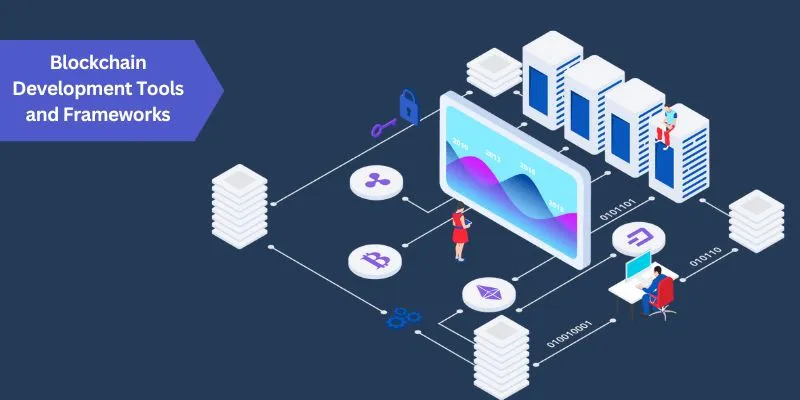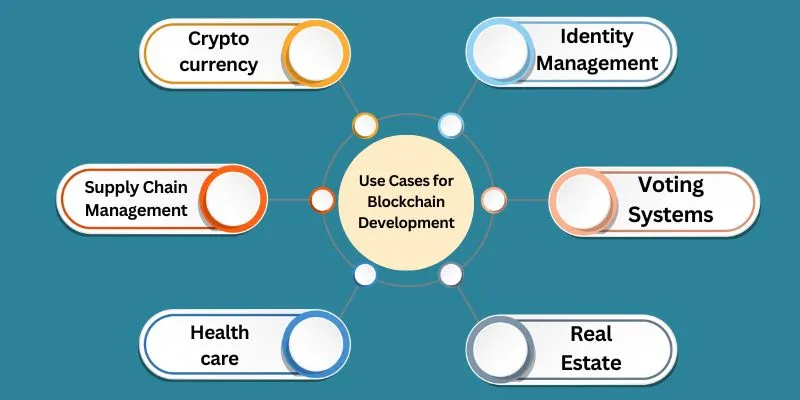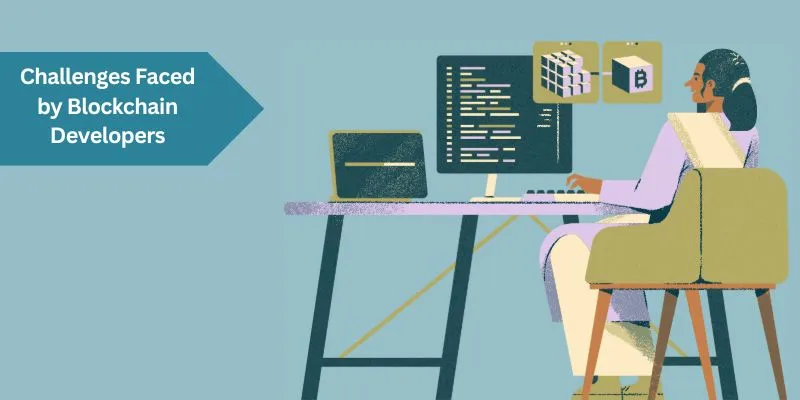Recent years have witnessed an exponentially growing interest in cryptocurrency and blockchain technologies, revolutionizing how we transact online transactions and store data. Due to this explosion of popularity, demand for software development related to trading virtual currencies such as Bitcoin, Ethereum and Litecoin has skyrocketed - especially programs used for such activities.
Blockchain and cryptocurrency software development has opened doors of opportunity for developers looking to broaden their skill set and stay ahead of competition.
As cryptocurrency and blockchain development technologies rise in prominence, developers must add these skills to their arsenal as cryptocurrency and blockchain tech grow rapidly. We will discuss why developers must include blockchain development within their toolbox as it evolves; keeping up with its progression is imperative in today's fast-moving field of computing.
We will explore the advantages and tools for developing blockchains, its use cases across industries, any opportunities or challenges they present developers as they work towards future progress in this emerging field.
No matter where your level of experience or career start-point lies as a developer, cryptocurrency software development and blockchain development offer invaluable skills that could lead to exciting career possibilities. Join me as we uncover why these fields should form part of any developer's toolbox!
Also Read: Guide to Blockchain Application Development : Detailed 2024
Rise of Blockchain Development
Blockchain development has quickly grown since introducing cryptocurrencies, like Bitcoin, in 2009. Although commonly associated with digital currency transactions, its use extends across various industries, such as finance, healthcare, and supply chain management.
Due to blockchain's increased usage, demand for blockchain developers has skyrocketed since 2017. According to Hired's Career Marketplace Report, demand has surged 517% since 2017. Furthermore, blockchain developers earn, on average, around $150,000 annually, making this profession one of the highest-paying roles within tech.
Security and Transparency
One of the primary advantages of blockchain technology is its security and transparency features. Traditional financial systems rely on intermediaries like banks to verify transactions, leading to delays and additional costs; with blockchain, transactions can be verified and recorded on a decentralized network without needing third-party verification or recording services.
Efficiency and Cost Savings
Blockchain's popularity stems largely from its potential to increase efficiency and save costs by eliminating transaction intermediaries, thus shortening transaction time frames while cutting transaction costs significantly.
Blockchain development technology has revolutionized supply chain management. Companies use it to track products as they move through their supply chains, which helps save both time and costs associated with manual tracking processes.
Decentralization
Decentralization is another factor propelling blockchain development forward. Blockchain's decentralized nature makes it ideal for industries looking to reduce reliance on intermediaries and central authorities, such as healthcare.
Tokenization
It refers to representing assets on the blockchain using digital tokens, enabling direct transfer without intermediaries, thus cutting costs and increasing efficiency. Tokenization has been an essential aspect of blockchain's rapid expansion.
Growing Use Cases
Finally, blockchain's expanding use cases drive increased demand for blockchain developers. As more industries explore its applications for potential use cases, more developers specializing in building and maintaining blockchain networks have become in demand.
Blockchain technology has proven itself in multiple industries, from gaming and real estate. For example, blockchain development platforms in gaming allow players to trade and exchange in-game assets securely. At the same time, real estate professionals use it to create decentralized property registries accessible securely to buyers and sellers.
Must Read: Learn the Basic Concepts Behind Blockchain Technology Now
Advantages of Blockchain Development
Blockchain development refers to creating and maintaining decentralized networks using blockchain technology for various uses, such as storing and transferring digital assets, verifying transactions, or creating smart contracts. Blockchain development brings many benefits, including increased security, transparency, and efficiency.
Increased Security
Blockchain development offers many advantages for security. Transactions recorded on the blockchain are verified and stored in a decentralized network, making them resistant to tampering or fraud. Furthermore, its cryptography ensures privacy and security during transactions - an ideal solution for industries dealing with sensitive information like finance, healthcare, and government.
Transparency
Another significant benefit of blockchain development is increased transparency. Transactions recorded on the blockchain can be seen by anyone, providing an auditable system. This makes blockchain an excellent solution for industries that demand transparency and accountability, such as government agencies or non-profit organizations.
Non-profit organizations are utilizing blockchain technology to enhance transparency and accountability about donations. By recording and verifying donations on a blockchain ledger, donors can be assured their donations are going toward their intended purposes. At the same time, organizations provide greater clarity to their stakeholders.
Efficiency
Blockchain technology also brings increased efficiency to transactions by eliminating intermediaries and automating processes, thus decreasing transaction times and associated costs. As such, blockchain technology is an excellent solution for industries that demand speedy yet economical transactions like supply chain management or logistics.
Blockchain technology is widely utilized within the supply chain management industry to increase efficiency and cut costs. By tracking products as they move through their respective supply chains with blockchain tracking software, companies can significantly decrease the time and costs associated with manual tracking processes such as tracking verification.
Decentralization
While traditional systems rely on one central authority for transaction verification and processing, blockchain technology utilizes decentralized networks to process and verify transactions, making it resistant to fraud or tampering.
Blockchain's decentralized nature makes it ideal for industries seeking to reduce the reliance on intermediaries and central authorities, such as healthcare. Blockchain technology is currently being employed in this regard by healthcare providers who utilize it to create decentralized medical records that can be securely accessed by patients and providers alike.
Smart Contracts
They execute themselves, with terms agreed between buyer and seller written directly into lines of code. Smart contracts allow for automated contract execution while eliminating intermediaries.
Real estate professionals have begun using blockchain technology to create smart contracts that automate the buying and selling process using smart contracts created through this method, which helps save both time and costs associated with buying/selling property.
Read About: Top 5 Blockchain Development Frameworks in 2024
Blockchain Development Tools and Frameworks

Blockchain development has become increasingly popular over time as more companies and industries discover its applications. As such, there has been an ever-increasing need for skilled blockchain developers - particularly those experienced in cryptocurrency software development - who possess these skills. To accommodate this growing need for expertise in developing cryptocurrency software. Several tools and frameworks have since aided cryptocurrency developers in creating and deploying their applications using this revolutionary technology.
Ethereum
Ethereum is a decentralized blockchain development platform that uses blockchain technology to run smart contracts. As one of the most widely-used dApp platforms, it offers developers various tools and frameworks for building decentralized apps (dApps). Furthermore, users can create cryptocurrency tokens of their own and write smart contracts using its programming language, Solidity.
Corda
It was specifically created to address the financial industry. As it is a permissioned blockchain network, only authorized parties can gain entry. Corda also provides its programming language called Kotlin for creating smart contracts and numerous consensus algorithms.
Stellar
Stellar is a decentralized payment network built using blockchain technology for fast, low-cost transactions. Developers can take advantage of various tools and frameworks provided by Stellar to build payment applications utilizing Stellar Script programming language, supporting various currencies (including cryptocurrency) while taking advantage of a built-in decentralized exchange for asset trading.
Truffle
It is an extremely popular blockchain development framework used for building Ethereum-based dApps. It offers developers a suite of tools for writing, testing, and deploying smart contracts; additionally, it supports multiple programming languages (including Solidity) and provides a built-in testing framework for smart contracts.
Remix
It is an online development environment for creating Ethereum-based dApps, providing developers with a browser-based interface for writing, testing, and deploying smart contracts. Remix is compatible with various programming languages (including Solidity),including its built-in debugger to help ensure accurate testing.
Ganache
It is a personal blockchain used for testing and development purposes, providing developers with a local blockchain environment where smart contracts can be tested and deployed locally. Ganache supports several programming languages (including Solidity) and debugging tools designed to simplify testing smart contracts.
EOSIO
EOSIO is an open-source blockchain platform created to facilitate the building of decentralized applications (dApps). It offers developers a range of tools and frameworks for this task - such as C++ for smart contract development - as well as multiple consensus algorithms such as delegated proof of stake (DPoS).
Quorum
Quorum was developed by J.P. Morgan as an invite-only blockchain platform designed for use within the financial industry and providing developers with tools and frameworks for building apps. Quorum supports numerous consensus algorithms, including Raft and Istanbul BFT. It provides Solidity as its programming language for writing smart contracts.
RSK
It is a smart contract platform built on the Bitcoin blockchain that provides developers with tools and frameworks for creating decentralized apps (dApps),including the programming language Solidity. RSK employs two-way pegs so Bitcoin can be used within its ecosystem; additionally, it supports several consensus algorithms, including merge mining.
Read About: Custom Blockchain App Development: A Comprehensive Guide for 2024
Use Cases for Blockchain Development

Blockchain has become increasingly popular as more industries explore its various applications. Blockchain is a distributed ledger technology that enables secure and transparent transaction records between parties without a central authority.
Cryptocurrency
Perhaps the best-known use case for blockchain development is cryptocurrency. Blockchain technology forms the backbone of popular cryptocurrencies like Bitcoin, Ethereum, and Litecoin.
It is essential in recording secure and transparent transactions between parties - an essential aspect of cryptocurrency transactions that are verified through nodes on a network of computers known as nodes in a process known as mining - essential components of cryptocurrency systems that must exist for their functionality to flourish.
Supply Chain Management
Another popular use for blockchain development is supply chain management. Blockchain technology can create an open and secure supply network that tracks goods from production to delivery - helping reduce fraud while increasing transparency for all parties involved in the supply chain network. Furthermore, blockchain can reduce counterfeit goods risk as each product can be assigned its unique identifier, which is recorded on the blockchain ledger.
Identity Management
Blockchain technology can also be utilized for identity management. Individuals can gain more control of their data when sharing it for any transaction using this method; additionally, this decentralized storage of personal information decreases the risk associated with identity theft due to it not residing on one central server that can be easily compromised.
Voting Systems
Blockchain technology can also be utilized for voting systems. Blockchain enables secure and transparent recording of votes to reduce voter fraud risks while increasing voter turnout by providing secure platforms where voters can cast their ballots from anywhere around the globe.
Healthcare
Blockchain technology can also be applied in healthcare. Patients can take control of their medical records with blockchain by choosing to share only with those healthcare providers they trust, thus helping reduce errors due to all healthcare providers having real-time access to all patient records in real-time.
Real Estate
Blockchain development technology can also be applied in the real estate industry. Real estate transactions recorded using this blockchain ledger technology can help reduce fraud risk while speeding up transaction processes as all parties involved can view real-time updates to information on a property deal.
Blockchain technology can also be applied to gaming. Players using it have greater control of their virtual assets stored on decentralized networks instead of central servers. All virtual asset transactions are recorded on an unalterable ledger for greater transparency and reduced fraud risk.
Must Read: Complete Guide of Blockchain App Development For 2024
Opportunities for Blockchain Developers
Blockchain technology disrupts many industries, from finance and healthcare to logistics and supply chains. With increased adoption comes the demand for developers specializing in this emerging field; therefore, we explore some opportunities for blockchain developers.
Crafting Smart Contracts
Smart contracts are self-executing contracts written directly in code between buyers and sellers, allowing transactions between parties without needing intermediaries to occur automatically. Creating smart contracts has become increasingly popular with blockchain developers, and professionals with skills in Solidity programming language are in high demand if creating them is part of your expertise.
Building Blockchain-Based Applications
Blockchain applications have quickly become popular across various industries. As a blockchain developer, you can develop blockchain applications using platforms like Ethereum or Hyperledger Fabric that provide tools and frameworks for building decentralized apps that interact with the network.
Building Decentralized Finance (DeFi) Applications
Decentralized Finance is an emerging field that uses blockchain technology to establish a decentralized financial system. DeFi applications aim to provide financial services without intermediaries like banks. Developers can create DeFi apps that allow users to borrow, lend, trade, and invest in cryptocurrencies. As the market rapidly expands, there is high demand for those skilled in DeFi development.
Blockchain Security
The technology is robust but not immune from attacks. Blockchain developers who specialize in security can assist organizations in designing secure blockchain solutions. In contrast, blockchain security specialists help identify application vulnerabilities and implement countermeasures against attacks - thus increasing the demand for expert-level knowledge regarding this technology field. With its increasing adoption comes an increasing demand for experts.
Cryptocurrency Development
Blockchain technology forms the backbone of cryptocurrencies like Bitcoin and Ethereum, offering developers the chance to specialize in its development by working on creating new coins or improving existing ones; also involved are developing wallets, exchanges and related applications related to cryptocurrencies - this field can offer high salaries to developers with the necessary expertise.
Blockchain Consulting
With relatively novel blockchain technology, organizations often require assistance with how best to adopt it. Blockchain consultants guide organizations in understanding its benefits, identifying use cases, and implementing solutions using this innovative technology. A good consultant must possess extensive knowledge of all industries where its applications may exist.
Blockchain Testing
Testing blockchain applications is a core element of blockchain software development. Blockchain developers often specialize in this aspect to ensure they are secure, reliable, and scalable - this includes testing smart contracts, blockchain protocols, and any other components present within a blockchain network. Experts in testing can work closely with organizations to develop testing strategies and frameworks.
Blockchain Education
The technology is still in its infancy, creating the need for proper education about it and its applications. Blockchain developers can serve as educators by teaching others about its fundamentals, applications, and how to develop blockchain solutions. This education may include creating courses or educational content and hosting training sessions.
Also Read: Tips and Tricks to Hire Blockchain Developers in 2024
Challenges Faced by Blockchain Developers

Blockchain has recently experienced rapid adoption across finance, healthcare, and logistics industries. But blockchain development does not come without its challenges.
Talent Shortage
One of the primary challenges blockchain development companies must contend with is finding qualified talent. Since blockchain technology is still relatively new, few experienced blockchain developers exist. The demand is high - making it hard for companies to hire the necessary talent. Blockchain development companies can overcome this hurdle by investing in training programs to equip developers with the necessary skills to work on blockchain projects.
Security
While blockchain technology is generally secure, it remains vulnerable to attacks from hackers who seek vulnerabilities within blockchain networks and applications to exploit. Companies offering blockchain development must ensure their solutions are completely safe from vulnerabilities by hiring experienced cybersecurity specialists and instituting effective protocols.
Interoperability
Blockchain technology is still in its infancy, with several blockchain platforms currently available - each boasting its features and capabilities - making it difficult for companies to develop solutions across platforms. Blockchain development companies can overcome this difficulty using protocols like Hyperledger Fabric, which provide network interoperability.
Scalability
Blockchain networks can quickly become slow and expensive when numerous transactions occur simultaneously since each node must validate each individually, taking time away from speed or security considerations. Blockchain development companies must create solutions capable of handling large numbers of transactions without compromising speed or security; companies can do this by choosing platforms designed specifically for scaling, like Ethereum.
Regulatory Compliance
Blockchain technology remains unregulated in many parts of the world, making it challenging for blockchain development companies to comply with existing regulations and laws when creating solutions utilizing this technology. Companies must ensure that the solutions they create meet these regulations and laws; compliance is particularly essential in industries like finance and healthcare, where compliance plays a vital role. Blockchain development companies may overcome this obstacle by hiring legal specialists who can guide them through the complex regulatory landscape.
Many organizations still rely on legacy systems that do not fully integrate with blockchain technology, posing a significant integration challenge for blockchain development companies. Hyperledger Fabric can be an excellent platform to meet this need.
Lack of Standardization
Blockchain technology is still in its early stages, which creates challenges when developing blockchain solutions with consistent and reliable performance. Companies can address this obstacle by contributing to blockchain standardization efforts or following industry best practices as part of a solution strategy.
Future of Blockchain Development
Blockchain technology has seen tremendous momentum over recent years. It can revolutionize multiple industries, including finance, healthcare, logistics, and more. But its future development remains unknown due to many factors which could impact its growth and adoption.
Increased Adoption
Several organizations, such as banks, governments, and healthcare providers, have recently adopted blockchain technology to streamline operations and boost efficiency. As more organizations realize its benefits, we should expect further adoption across industries.
Increased Collaboration
As the blockchain industry matures, we expect increased collaboration between organizations and industries. Blockchain technology offers secure yet transparent collaboration tools which could open doors to more partnerships between companies working on blockchain projects.
Interoperability
Interoperability remains one of the primary challenges to blockchain developers; however, we can expect increased efforts to overcome it soon. Specifically, developers are creating protocols to enable interoperability among different blockchain networks, increasing the adoption of this technology.
Decentralization
One of the key principles of blockchain technology is decentralization. We should anticipate seeing more organizations adopting it due to its decentralized capabilities soon, with more organizations realizing the advantages of transparency, security, and efficiency. We may see more organizations adopt blockchain tech for these features alone.
Increased Focus on Privacy
More organizations should adopt blockchain technology to safeguard user data. It allows for secure transactions while remaining completely private - this should see more organizations adopt it soon.
Integration with Emerging Technologies
Blockchain technology has the potential to combine with emerging technologies like artificial intelligence (AI),machine learning, and the Internet of Things (IoT) to form innovative solutions. As these emerging technologies advance, we could see even greater integration of blockchain tech with them - unlocking the even greater potential for developing blockchain tech.
Read Also: Tips on How to Become a Blockchain Developers
Why is Blockchain Development Essential in the Developer Toolkit?
Blockchain app development has quickly gained popularity over recent years and now forms an essential part of developer toolkits. Blockchain development offers developers numerous benefits - including creating secure decentralized apps.
Cryptocurrencies
Cryptocurrencies have emerged as one of the key developments in the blockchain industry in recent years, becoming increasingly widely used for transactions and investments by people worldwide. With many people turning to cryptocurrencies for transactions and investments, cryptocurrency development companies must meet increased demand from clients seeking safe and dependable blockchain-based solutions.
Increased Security
One of the primary advantages of blockchain technology is its security. Utilizing cryptographic techniques to protect transactions and data, blockchain solutions offer more protection than traditional systems; consequently, they have gained popularity across industries, including finance, healthcare, and logistics.
Decentralization
Blockchain technology offers several distinct advantages over its traditional counterparts regarding decentralization. Traditional systems rely on central authorities that control them, potentially leading to issues like censorship or data breaches; by contrast, blockchain solutions are decentralized, so no central entity controls them, making these more transparent, secure, and resistant to censorship than their traditional counterparts.
Innovation
Blockchain technology is still in its infancy, providing much room for creativity. Cryptocurrency development companies can utilize the capabilities of blockchain to craft innovative solutions that leverage their strengths to address complex problems like identity verification, supply chain management, and voting systems.
Reduced Costs
Blockchain-based solutions may be more cost effective than traditional systems. Blockchain technology eliminates intermediaries, leading to lower transaction fees and other associated expenses; moreover, blockchain solutions tend to be more efficient at data management and storage, resulting in cost savings overall.
The Key Takeaway
Thanks to the rise of cryptocurrencies and the increasing need for secure, decentralized solutions, blockchain development has quickly become an essential element of developer tools. Blockchain provides developers with powerful tools for developing cutting-edge solutions with security, decentralization, transparency, and potential for innovation built right into its technology platform.
As the industry matures, interoperability between different blockchain networks is increasing - opening up more applications of blockchain-based solutions across industries and creating potential cost savings that make blockchain solutions attractive for companies looking to streamline operations.
Blockchain development has become an essential element of cryptocurrency development companies. The rise of cryptocurrencies has opened up an entirely new market for companies offering blockchain-based solutions. As more people utilize cryptocurrencies as transaction and investment vehicles. Demand for secure and dependable blockchain-based solutions will only continue to increase.
Blockchain development gives developers powerful tools for crafting innovative and secure solutions. As it matures, we should expect more groundbreaking innovations that transform various industries. Therefore, developers must add blockchain development as part of their toolbox to keep abreast of recent advances in this space.





.webp)







Share this blog